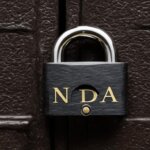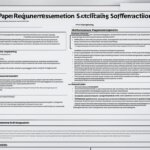Table of Contents
If you’re a business owner, legal representative or involved in confidential business transactions, you may have heard of an NDA, or Non-Disclosure Agreement. But what is NDA and why is it important? In this quick guide, we’ll provide you with a clear understanding of what is NDA, its purpose, and why it’s a crucial legal document for safeguarding sensitive information.
An NDA is a type of legal agreement between two or more parties, which outlines the confidential material, knowledge, or information that the parties wish to share with each other for a specific purpose, but not with any third party. In simple words, the purpose of the NDA is to ensure that any sensitive information shared between parties is kept confidential and is not disclosed to any unauthorized persons.
Key Takeaways
- An NDA is a legal document that ensures confidentiality in business transactions.
- It outlines the confidential material that parties wish to share for a specific purpose, but not with any third party.
- An NDA is important for protecting sensitive or confidential information from unauthorized disclosure.
- The key elements of an NDA include the parties involved, the scope of confidentiality, duration, and any exceptions or limitations.
- Properly implemented, an NDA can protect sensitive information and maintain trust between parties in business transactions.
What is NDA?
An NDA or Non-Disclosure Agreement is a legal contract between two or more parties that aims to protect confidential or proprietary information that is shared between them. The agreement establishes the expectation of confidentiality, outlining specific terms and conditions that restrict the use, access, or disclosure of certain information.
NDAs are crucial when dealing with sensitive information, which could include technology, trade secrets, financial data, customer information, and other sensitive business materials.
The purpose of an NDA is to ensure that the parties involved keep private information under wraps, preventing unauthorized disclosure that could harm business operations, intellectual property, and other essential assets. NDAs are widely used in various industries, including technology, manufacturing, entertainment, healthcare, and finance.
Whether you are a startup founder, an entrepreneur, or working in an established organization, understanding what is NDA is essential in protecting your business and the confidential information that you hold.
“An NDA is not a matter of mere formality. It is an essential legal document in today’s fast-paced and highly competitive business landscape, where information is often considered the most valuable currency.”
Elements of an NDA
Non-Disclosure Agreements are comprehensive legal documents that contain various elements. A well-crafted NDA should clearly outline the parameters of confidentiality between the parties involved in a business transaction. Here are the crucial elements that make up an NDA:
Parties Involved
One of the essential elements of an NDA is identifying the parties involved in the agreement. This includes listing the names of the individuals, organisations, or companies included in the contract. It is crucial to specify the obligations and restrictions of each party.
Scope of Confidentiality
The scope of confidentiality section is another critical component of an NDA. It defines the type of information that the parties agree to keep confidential. The scope of confidentiality should sufficiently outline the relevant information to be protected, including proprietary information, trade secrets, and business strategies.
Duration of the Agreement
The duration of the agreement will specify the length of time that the NDA is in force. The duration can be time-based, project-based, or any other predetermined period agreed to by the parties involved. It is essential to set a fixed term for the NDA to ensure that it does not continue indefinitely.
Exceptions and Limitations
The exceptions and limitations section of an NDA details the situations where the parties are exempt from maintaining confidentiality. Some common exceptions include instances where confidential information is already publicly available or in cases where information is required to be disclosed by law.
“The parties must ensure that the NDA is not too restrictive, or in conflict with the public interest.”
It is vital to consider the implications of each element of an NDA carefully. It is also advisable to seek legal guidance when drafting an NDA, to ensure that it is legally enforceable and does not have any unintended consequences.
Conclusion
In conclusion, it is crucial to have a clear understanding of what is NDA and its significance in maintaining confidentiality in business transactions. By implementing NDA agreements appropriately, individuals and businesses can ensure that their sensitive information remains protected from unauthorized disclosure.
It is important to remember that NDAs are legal contracts and should be carefully drafted and reviewed by competent legal professionals to ensure that all the elements and parties involved are adequately addressed. This will help to avoid any potential breaches and legal disputes that may arise from improperly drafted agreements.
In summary, an NDA is a powerful tool for safeguarding confidential information and maintaining trust between parties involved in various business relationships. By following best practices and investing in competent legal advice, individuals and businesses can leverage NDAs to take advantage of new opportunities while minimizing risks and protecting sensitive information.
FAQ
What is an NDA?
An NDA, or Non-Disclosure Agreement, is a legal contract between two or more parties that outlines the confidential information they will share with each other and restricts its disclosure to others.
Why is an NDA important?
NDA is essential for protecting sensitive information from being leaked or misused. It helps establish trust and confidentiality between parties involved in business relationships.
What does an NDA typically include?
An NDA usually includes details about the parties involved, the scope and duration of confidentiality, any exceptions, and the consequences of breaching the agreement.
Are there any exceptions to an NDA?
Yes, there can be exceptions to an NDA, such as disclosures mandated by law, disclosures with prior written consent, or disclosures of information already in the public domain.
Can an NDA be enforced?
Yes, an NDA is a legally binding document, and if any party breaches the agreement, the aggrieved party can seek legal remedies and pursue damages for the loss suffered.
How long does an NDA last?
The duration of an NDA can vary and is typically specified in the agreement. It can be for a specific period, until completion of a project, or for the duration of the business relationship.
Who should use an NDA?
NDA is useful for any individual or business that wants to protect their confidential information when sharing it with others, such as during negotiations, partnerships, or collaborations.
Can an NDA be modified or revoked?
Yes, an NDA can be modified or revoked, but it requires mutual consent from all involved parties. Any modifications or revocations should be documented in writing and signed by all parties.












